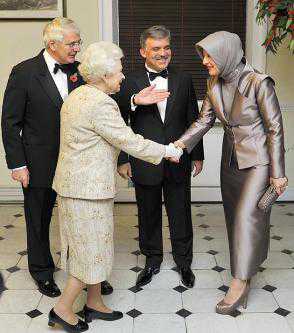Once considered a faux pas in fashion and politics, fashionistas are now embracing Islamic clothing, spawning the development of upmarket Islamic fashion houses
By Alexandra Hudson / Reuters, ISTANBUL, Turkey

Britain’s Queen Elizabeth II, left, greets Hayrunnisa Gul, the wife of Turkish President Abdullah Gul, center, as former British prime minister John Major looks on during a ceremony and reception in Whitehall in central London on Tuesday.
Photo: Reuters
Along Istanbul’s busy Eminonu waterfront, women swathed in dark coats and scarves knotted once under the chin jostle past others clad in vivid colors and head coverings carefully sculpted around the face.
Two decades ago such a polished, pious look scarcely existed in Turkey, but today it has the highest profile exponents in Turkish First Lady Hayrunnisa Gul and Turkish Prime Minister Tayyip Erdogan’s wife Emine, and the brands behind it plan ambitious expansion.
The headscarf remains one of Turkey’s most divisive issues. Everything from the way it is tied and accessorized, to the poise and demeanor of the wearer, is laden with meaning in this majority Muslim, but officially secular, country of 74 million.
From a simple head covering, stigmatized in the early days of the Turkish Republic as backward and rural, it the last decades it has become a carefully crafted garment and highly marketable commodity, embodying the challenge of a new class of conservative Muslims to Turkey’s secularist elites.
“It was hard to find anything chic for the covered women 10 years ago, but fashion for pious women has made huge progress in the last six to seven years,” said Alpaslan Akman, an executive in charge of production and marketing at Muslim fashion brand Armine.
Armine is known for its high-impact campaigns. Huge posters have hung in the heart of Istanbul’s bar and nightclub district — the serene models contrasting with the commotion below.
The brand teams colorful scarves with figure-skimming coats, pert collars, big buttons and ruffled sleeves.
A coat typically sells for around 200 Turkish lira (US$143), while scarves retail for around 50 lira.
“We are much luckier than -previous generations, we have more designs and colors of scarves to choose from,” said 30-year-old Filiz Albayrak, a sales assistant in an Istanbul scarf shop.
Around 69 percent of Turkish women cover their heads in some form, with 16 percent using the more concealing and self-consciously stylish “turban” style scarf, which tightly covers the hair and neck, according to a 2007 study.
via Politics aside, headscarves are making a comeback in Turkey – Taipei Times.

Leave a Reply